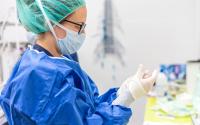9(MDAxODM1NDU0MDEzMzc2OTczMTc2Y2RjYw004))
MARY LOUISE KELLY, HOST:
New CDC data shows sexually transmitted infections reached an all-time high in 2019. The biggest spike was in syphilis cases, up 74% over five years. California leads the country in infections. Men who have sex with men make up half the cases. April Dembosky at KQED in San Francisco explains how this happened.
APRIL DEMBOSKY, BYLINE: The Castro Country Club in San Francisco is not a resort. It’s where gay men come to get help with drug addiction, especially methamphetamine. Director Billy Lemon says syphilis comes with the territory.
BILLY LEMON: In the 12-step community, if meth was your thing, I mean, everybody’s had syphilis. I’m not even sure how many times I had it.
DEMBOSKY: He tries to remember. Was it four, five times?
LEMON: In my life, probably four times.
DEMBOSKY: A recent rise in meth use has become a key driver of syphilis, especially in the West. While Billy Lemon is now sober, in his heyday, he’d stay awake partying for days.
LEMON: A lot of the reasons that people like using meth is that it makes sex really awesome.
DEMBOSKY: It also hampers your judgment.
LEMON: And so condoms are kind of thrown out the door.
DEMBOSKY: Lemon says in general, condoms have fallen out of favor in the gay community here, especially now that we have such effective drugs that prevent transmission of HIV. Take away the risk of catching a fatal disease, and syphilis doesn’t seem like such a big deal.
LEMON: It does not seem like a big deal at all. Yeah, so that’s weird to say out loud. Anyways…
DEMBOSKY: Syphilis is not benign. It can cause blindness, deafness or brain damage. It is easy to treat, though. A shot of penicillin in the butt, and you’re done. But diagnosing syphilis can be tricky and intimate.
INA PARK: I’m, like, crouched below them. I’m, like, lifting up their scrotum.
DEMBOSKY: Dr. Ina Park works at a public STD clinic in San Francisco.
PARK: Adjusting my head and looking from all angles.
DEMBOSKY: She has to do these gymnastics to find the kinds of rashes associated with syphilis.
PARK: If you hadn’t been looking for it, you never would have caught it.
DEMBOSKY: Park is trained to look, but she says doctors in regular family medicine clinics don’t. They don’t know that fatigue is a telltale sign of syphilis.
PARK: How many people – you know, the patient came in saying, I’m tired. How many people are going to say, take off your pants and lift up your scrotum; I want to look, you know? We only do that at the STD clinic because that’s what we do.
DEMBOSKY: But specialized public STD clinics have been shutting down nationwide. One reason is persistent underfunding; another, the Affordable Care Act. Dr. Karen Smith says in a strange way, the 2010 health law contributed to the closure of some STD clinics.
KAREN SMITH: Honestly, I think everyone thought they weren’t going to be necessary.
DEMBOSKY: I talked to Dr. Smith about this decline two years ago, when she was director of California’s Department of Public Health. She says once Obamacare was in place, the thought was that STD testing would happen in primary care clinics.
SMITH: And I think that we sort of all assumed that, you know, if you’ve got health insurance and you’ve got access to a doctor, that’s all that you need. And it turns out that that’s not really all that you need.
DEMBOSKY: People still had affairs they didn’t want to talk about with their family doctor, and some family doctors didn’t want to probe into their patients’ sex lives.
SMITH: That loss of anonymous care really was a problem.
DEMBOSKY: The latest rise in STD numbers is from right before the pandemic, but the CDC doesn’t think the 2020 numbers will be any better. Even if people had less sex during the shutdown, which we’re not sure about, public health workers and testing supplies were redeployed to COVID.
For NPR News, I’m April Dembosky in San Francisco.
KELLY: And this story comes from NPR’s partnership with KQED and Kaiser Health News. Transcript provided by NPR, Copyright NPR.







